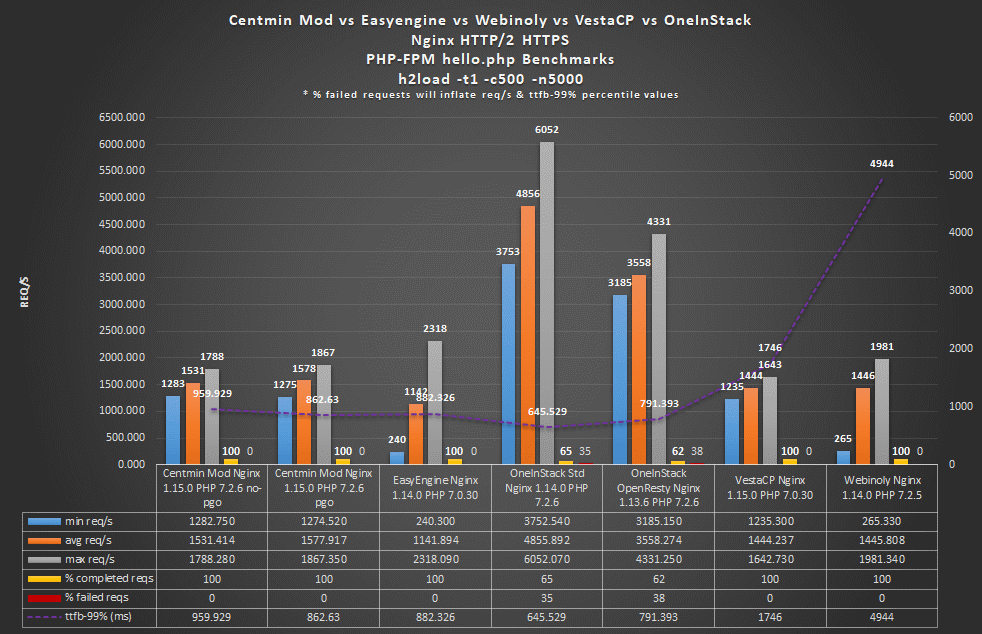This discussion has me curious so I tested my Centmin Mod LEMP stack with PHP-FPM unix sockets on CentOS 7.8 64bit and with PHP 8.0.0beta3 and scaling is way better than I remember unix sockets to be for at least hello.php tests. Managed to push to 60,000 concurrent users with wrk-cmm with bind source IP mode to workaround port exhaustion
wrk-cmm -b 127.0.0.1/27 -t1 -c60000 -d15s --latency --breakout http://localhost/hello.php; ss -s; netstat -l | grep php;
Running 15s test @ http://localhost/hello.php
1 threads and 60000 connections
Thread Stats Avg Stdev Max +/- Stdev
Latency 1.66s 227.26ms 1.79s 88.34%
Connect 968.04ms 424.74ms 1.75s 58.10%
TTFB 1.66s 227.26ms 1.79s 88.34%
TTLB 2.44us 0.85us 35.00us 94.26%
Req/Sec 34.23k 2.78k 41.39k 91.67%
Latency Distribution
50% 1.74s
75% 1.76s
90% 1.78s
95% 1.78s
99% 1.78s
422717 requests in 15.10s, 134.24MB read
Requests/sec: 27994.36
Transfer/sec: 8.89MB
Total: 7122 (kernel 9319)
TCP: 107998 (estab 2, closed 102807, orphaned 1740, synrecv 0, timewait 102807/0), ports 0
Transport Total IP IPv6
* 9319 - -
RAW 0 0 0
UDP 2 1 1
TCP 5191 5184 7
INET 5193 5185 8
FRAG 0 0 0
unix 2 [ ACC ] STREAM LISTENING 34904346 /var/run/php-fpm/php-fpm.sock
php -v
PHP 8.0.0beta3 (cli) (built: Sep 1 2020 20:07:51) ( NTS )
Copyright (c) The PHP Group
Zend Engine v4.0.0-dev, Copyright (c) Zend Technologies
with Zend OPcache v8.0.0beta3, Copyright (c), by Zend Technologies
Looks like PHP 8.0.0beta3 is scaling way better than PHP 7.4.9. For PHP 8.0.0 beta3 unix sockets pushed to 60,000 concurrent hello.php requests without errors and TCP on port 9000 pushed to 50,000 concurrent hello.php requests without errors
wrk-cmm -b 127.0.0.1/27 -t1 -c50000 -d15s --latency --breakout http://localhost/hello.php; ss -s; netstat -plant | grep php;
Running 15s test @ http://localhost/hello.php
1 threads and 50000 connections
Thread Stats Avg Stdev Max +/- Stdev
Latency 1.78s 244.26ms 1.99s 88.86%
Connect 815.33ms 357.13ms 1.45s 57.62%
TTFB 1.78s 244.26ms 1.99s 88.86%
TTLB 2.62us 1.11us 136.00us 94.82%
Req/Sec 26.60k 2.63k 28.18k 95.24%
Latency Distribution
50% 1.85s
75% 1.87s
90% 1.89s
95% 1.97s
99% 1.98s
338359 requests in 15.11s, 107.45MB read
Requests/sec: 22388.07
Transfer/sec: 7.11MB
Total: 3925 (kernel 5073)
TCP: 153200 (estab 3573, closed 101428, orphaned 4683, synrecv 0, timewait 101427/0), ports 0
Transport Total IP IPv6
* 5073 - -
RAW 0 0 0
UDP 4 3 1
TCP 51772 51766 6
INET 51776 51769 7
FRAG 0 0 0
tcp 41715 0 127.0.0.1:9000 0.0.0.0:* LISTEN 15096/php-fpm: mast
PHP 8 is dam fine !
edit: at 5,000 user concurrency tested TCP vs Unix Socket PHP 8.0.0beta3 again and wrk-cmm doesn’t show errors but enabling Nginx vhosts stats and monitoring my upstreams, I see nginx is recording unix socket errors in 4xx which according to logs is 499 errors. While PHP-FPM TCP ran without errors.
edit:
For completeness, tested with latest hey too, seems unix sockets is showing good performance and scalability for once compared to TCP for PHP-FPM. Previous tests haven’t shown such good scalability for concurrent users for unix sockets !
hey non-https benchmarks with 5,000 concurrent users and 100k requests and 1 cpu core
PHP-FPM Unix sockets ~1.39% faster than TCP
TCP
hey -cpus 1 -n 100000 -c 5000 http://localhost/hello.php
Summary:
Total: 16.2777 secs
Slowest: 3.1469 secs
Fastest: 0.0011 secs
Average: 0.7833 secs
Requests/sec: 6143.3903
Response time histogram:
0.001 [1] |
0.316 [635] |
0.630 [3924] |■■
0.945 [91507] |■■■■■■■■■■■■■■■■■■■■■■■■■■■■■■■■■■■■■■■■
1.259 [39] |
1.574 [2474] |■
1.889 [1204] |■
2.203 [60] |
2.518 [153] |
2.832 [0] |
3.147 [3] |
Latency distribution:
10% in 0.6540 secs
25% in 0.7340 secs
50% in 0.7829 secs
75% in 0.7999 secs
90% in 0.8169 secs
95% in 0.8663 secs
99% in 1.5877 secs
Details (average, fastest, slowest):
DNS+dialup: 0.0211 secs, 0.0011 secs, 3.1469 secs
DNS-lookup: 0.0000 secs, 0.0000 secs, 0.0235 secs
req write: 0.0106 secs, 0.0000 secs, 1.2172 secs
resp wait: 0.7457 secs, 0.0010 secs, 1.6507 secs
resp read: 0.0030 secs, 0.0000 secs, 0.8266 secs
Status code distribution:
[200] 100000 responses
Unix Sockets
hey -cpus 1 -n 100000 -c 5000 http://localhost/hello.php
Summary:
Total: 16.0537 secs
Slowest: 2.9224 secs
Fastest: 0.0008 secs
Average: 0.7718 secs
Requests/sec: 6229.0776
Response time histogram:
0.001 [1] |
0.293 [476] |
0.585 [2522] |■
0.877 [92117] |■■■■■■■■■■■■■■■■■■■■■■■■■■■■■■■■■■■■■■■■
1.169 [888] |
1.462 [1624] |■
1.754 [2181] |■
2.046 [44] |
2.338 [108] |
2.630 [38] |
2.922 [1] |
Latency distribution:
10% in 0.6372 secs
25% in 0.7155 secs
50% in 0.7736 secs
75% in 0.7853 secs
90% in 0.8008 secs
95% in 0.8673 secs
99% in 1.5896 secs
Details (average, fastest, slowest):
DNS+dialup: 0.0204 secs, 0.0008 secs, 2.9224 secs
DNS-lookup: 0.0000 secs, 0.0000 secs, 0.5269 secs
req write: 0.0110 secs, 0.0000 secs, 1.2326 secs
resp wait: 0.7339 secs, 0.0007 secs, 1.8985 secs
resp read: 0.0030 secs, 0.0000 secs, 0.8072 secs
Status code distribution:
[200] 100000 responses
So really not much between then provided both or either TCP and Unix Socket setup is optimally configured.



